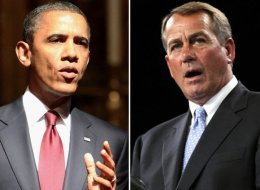Jeff Sessions: Saying Millionaires Should Share Pain Is 'Rather Pathetic'
Tuesday, July 5, 2011

I recommend them, too. Both are fabulous, if not jaw-clench
About 112th Congress
Read the Article at HuffingtonPost

I recommend them, too. Both are fabulous, if not jaw-clench
About 112th Congress
Read the Article at HuffingtonPost

What do you do for a living?
About 112th Congress
Read the Article at HuffingtonPost

If you don't pay federal income tax, do you think that that means that you don't pay any taxes?
The rich have gotten rich off of the sweat and labor of others and then have taken those profits to buy politician
About 112th Congress
Read the Article at HuffingtonPost

The rich have gotten rich off of the sweat and labor of others and then taken those profits to buy politician
That's the true nature of capitalism
Then, the rich took those profits and further gamed the system, by rigging the electoral process, enabling them to stack the government elected with corporate-
Over the course of US history, corporatio
Democrats (controlle
Democratic voters have mistakenly believed that Obama and Democrats were for strong regulation
The DLC-contro
Read the Article at HuffingtonPost

The Top 3 Lies About Taxes:
Lie Number 1) Poor people don't pay taxes.
Example: From The Center on Budget and Policy Priorities
At a hearing last month, Senator Charles Grassley said, "According to the Joint Committee on Taxation, 49 percent of households are paying 100 percent of taxes coming in to the federal governmentThe Center on Budget and Policy Priorities." At the same hearing, Cato Institute Senior Fellow Alan Reynolds asserted, "Poor people don't pay taxes in this country." Last April, referring to a Tax Policy Center estimate of households with no federal income tax liability in 2009, Fox Business host Stuart Varney said on Fox and Friends, "Yes, 47 percent of households pay not a single dime in taxes."

If it costs $100 to build a bridge and you have 100 MILLION dollars and I have just 100 dollars, and paying 26-33% of that 100 dollars isn't going to leave me enough to eat, YOU'RE NOT PAYING ENOUGH. And you'd better pay it all and soon because if I don't get enough to eat or if I have to sleep in the snow, I'm either going to dle or you're going to need Blackwater
How The RIch Get RIcher And Stick Us With The BIll
Even Warren Buffett admits it.
Read the Article at HuffingtonPost

The most BS argument to date: "The cuts and the pain must be shared by all".
It presumes that the poor and the middle classes haven't born the brunt of what Republican
It presumes that the pain of losing a few million dollars when you have hundreds of millions, even billions, is equivalent to the pain of not knowing where your next meal is coming from, or losing the roof over your head and sleeping in your car or on the street.
Read the Article at HuffingtonPost

The TeaParty is an effective nemesis for Obama and the DLC-contro
If Obama and the DLC-Democr
Instead of taking to the bully pulpit and announcing increased security on government properties hosting these events, Obama disappeare
What Obama did instead during the same TownHall time period was unleash federal security forces to Pittsburgh (using the new weaponry on dissenters who the 'establish
Obama has no problem quelling dissent or inspiring our better angels when he wants or needs to.
Obama wants to drive a wedge between the base of the Republican
The Tea Party serves this end in several ways. Chiefly though, it lets Democrats keep a legislativ
Obama didn't invent this plan -- It's been on the drawing boards of the DLC for years.
Read the Article at HuffingtonPost

If Republican
Read the Article at HuffingtonPost

So what Brooks is saying is that he, as a conservati
Read the Article at HuffingtonPost

60 Minutes looks at the world's new corporate tax havens:
(CBS News)
Our government is in knots over ways to lower the federal budget deficit. Well, what if we told you we found a pot of money - over $60 billion a year - that could be used to help out?
That bundle is tax money not coming in to the IRS from American corporatio
Tax havens: Do companies pay their fair share?
"60 Minutes" correspond
Read the Article at HuffingtonPost

Corporate Tax Schemes Cost Billions
(AP) Multinational corporatio ns avoided $45 billion in U.S. taxes last year by artificial ly fixing prices for transactio ns with foreign affiliates , according to a study released Wednesday by Sen. ByronDorga n.
The companies moved profits out of the United States in two ways: by overpricing goods sold to US operations by foreign affiliates and by underprici ng goods purchased by those foreign affiliates , the study found.
This practice, known as transfer pricing, moves income out of the UnitedStates and effectivel y puts company profits out of reach of the Internal Revenue Service.
Artificially high prices documented by the study include $5,655 for a toothbrush , $5,000 for a flashlight and $2,306 for a hypodermic syringe. Examples of underprice d goods were $1.58 for a ton of soybeans, $528 for a bulldozer and 82 cents for a prefabrica ted metal building.
The study by Simon J. Pak and John S. Zdanowicz, both finance professors at Florida International University , estimated the 2000 total tax loss at nearly $45 billion. Earlier studies by the pair uncovered tax losses of $42.7 billion in 1999 and $35.7 billion in 1998.
Dorgan, D-N.D., included $2 million in the annual Treasury Department spending bill to allow the two professors to expand their studies to recommend ways the IRS can begin collecting these taxes.
"Every individual and company is forced to make up the differences with income taxes that are higher than they would need to be if the internatio nal corporatio ns who are avoiding their tax responsibi lity were paying their fair share," Dorgan said.
The companies involved were not identified in the study, which is based on Commerce Department trade data focused on international pricing of goods.
The study did identify countries to which income from the United States is shifted. The top five: Canada, $15.8 billion; Japan, $14 billion; Mexico, $9.9 billion; the United Kingdom, $8.8 billion; and Germany, $8.3 billion.
We’ve already seen this movie: A similar tax holiday was offered in 2004, with a similar sales pitch. And it was a total failure. Companies did indeed take advantage of the amnesty to move a lot of money back to the United States. But they used that money to pay dividends, pay down debt, buy up other companies, buy back their own stock — pretty much everything except increasing investment and creating jobs. Indeed, there’s no evidence that the 2004 tax holiday did anything at all to stimulate the economy.
What the tax holiday did do, however, was give big corporations a chance to avoid paying taxes, because they would eventually have repatriate d, and paid taxes on, much of the money they brought in under the amnesty. And it also gave these companies an incentive to move even more jobs overseas, since they now know that there’s a good chance that they’ll be able to bring overseas profits home nearly tax-free under future amnesties.
Historically, the term “tax rate” has meant the average or effective tax rate — that is, taxes as a share of income. The broadest measure of the tax rate is total federal revenues divided by the gross domestic product.
By this measure, federal taxes are at their lowest level in more than 60 years. The CongressionalBudgetO ffice estimated that federal taxes would consume just 14.8 percent of GDP this year. The last year in which revenues were lower was 1950, according to the OfficeOfMa nagementAn dBudget.
The postwar annual average is about 18.5 percent of GDP Revenues averaged 18.2 percent of GDP during Reagan's Administration; the lowest percentage during that administra tion was 17.3 percent of G.D.P. in 1984.
In short, by the broadest measure of the tax rate, the current level is unusually low and has been for some time. Revenues were 14.9 percent of GDP in both 2009 and 2010.
Yet if one listens to Republicans, one would think that taxes have never been higher, that an excessive tax burden is the most important constraint holding back economic growth and that a big tax cut is exactly what the economy needs to get growing again.
HouseRepublicans released a plan to reduce unemployme nt. Its principal provision would reduce the top statutory income tax rate on businesses and individual s to 25 percent from 35 percent. No evidence was offered for the Republican argument that cutting taxes for the well-to-do and big corporatio ns would reduce unemployme nt; it was simply asserted as self-evide nt.
One would not know from the Republican document that corporate taxes are expected to raise just 1.3 percent of GDP in revenue this year, about a third of what it was in the 1950s.
The GOP says global competitiveness requires the UnitedStat es to reduce its corporate tax rate. But the UnitedStat es actually has the lowest corporate tax burden of any of the member nations of the Organizati on for Economic Cooperatio n and Developmen t. Compare here.
[...]
The truth of the matter is that federal taxes in the UnitedStates are very low. There's no reason to believe that reducing them further will do anything to raise growth or reduce unemployme nt.
© Blogger templates Newspaper by Ourblogtemplates.com 2008
Back to TOP